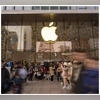The US Justice Department, alongside more than a dozen states, has initiated a significant antitrust lawsuit against tech giant Apple, accusing the company of unlawfully monopolizing the smartphone market. This legal action marks the latest in a series of antitrust complaints targeting major players in the tech industry, as authorities aim to rein in the power of these massive corporations that have largely operated unchecked for decades.
Attorney General Merrick Garland announced the complaint, alleging that Apple has maintained its dominant position in the smartphone ) market not solely through competitive merits but also by violating federal antitrust laws. Garland emphasized the importance of preventing companies from unlawfully raising prices, stating that consumers should not bear the burden of such illegal actions.
market not solely through competitive merits but also by violating federal antitrust laws. Garland emphasized the importance of preventing companies from unlawfully raising prices, stating that consumers should not bear the burden of such illegal actions.
The lawsuit, filed in the US District Court for the District of New Jersey, follows years of criticism against Apple’s restrictive app store terms, high fees, and its closed ecosystem approach to hardware and software integration. While Apple’s products are known for their user-friendly design, critics argue that the company’s tight control over third-party interactions stifles competition and innovation.
In response to the allegations, Apple has denied any wrongdoing and vowed to vigorously defend itself against the lawsuit. The company expressed concerns that the legal action could lead to excessive government intervention in technology design, potentially hindering innovation.
Garland highlighted the broader implications of Apple’s alleged monopoly, stating that such practices threaten free and fair markets, stifle innovation, and result in increased costs for consumers. He emphasized the need to challenge Apple’s dominance to prevent further strengthening of its smartphone monopoly.
One of the key issues raised in the lawsuit is Apple’s control over its iOS operating system, which the company allegedly uses to block innovative apps and services from competitors. Additionally, Apple has faced criticism for its 30% commission on most sales through its app store, with companies arguing that this fee is unjustifiably high due to Apple’s significant market share.
The complaint also points out disparities in user experience between Apple and its competitors. For instance, Apple allows iPhone users to send high-quality multimedia messages seamlessly, while messages to Android phones are often slower and of lower quality. Critics argue that such practices create a class divide and make it challenging for users and developers to venture outside the Apple ecosystem.
In Europe, regulations have already forced Apple to make adjustments, such as granting other companies access to the iPhone’s tap-to-pay hardware chip. However, these rules are limited to the European Union, leaving the issue largely unresolved in other markets.
The lawsuit seeks specific remedies that could potentially reshape Apple’s business model. The Justice Department aims to prevent Apple from using its app store to block innovative apps and to remove restrictions that limit integration with other technologies. While the complaint does not explicitly call for a breakup of Apple, it seeks relief to address any competitive harm caused by the company’s practices.
Apple’s legal challenges come amid growing scrutiny of Big Tech companies’ market dominance. The Biden administration has signaled a commitment to enforcing antitrust laws and promoting competition in the tech sector, with Apple becoming the latest target in this effort.
As the lawsuit unfolds, it will likely have far-reaching implications for Apple’s business practices, as well as broader discussions about competition and regulation in the digital economy. The outcome of this landmark case will be closely watched by industry observers, consumers, and policymakers alike.











